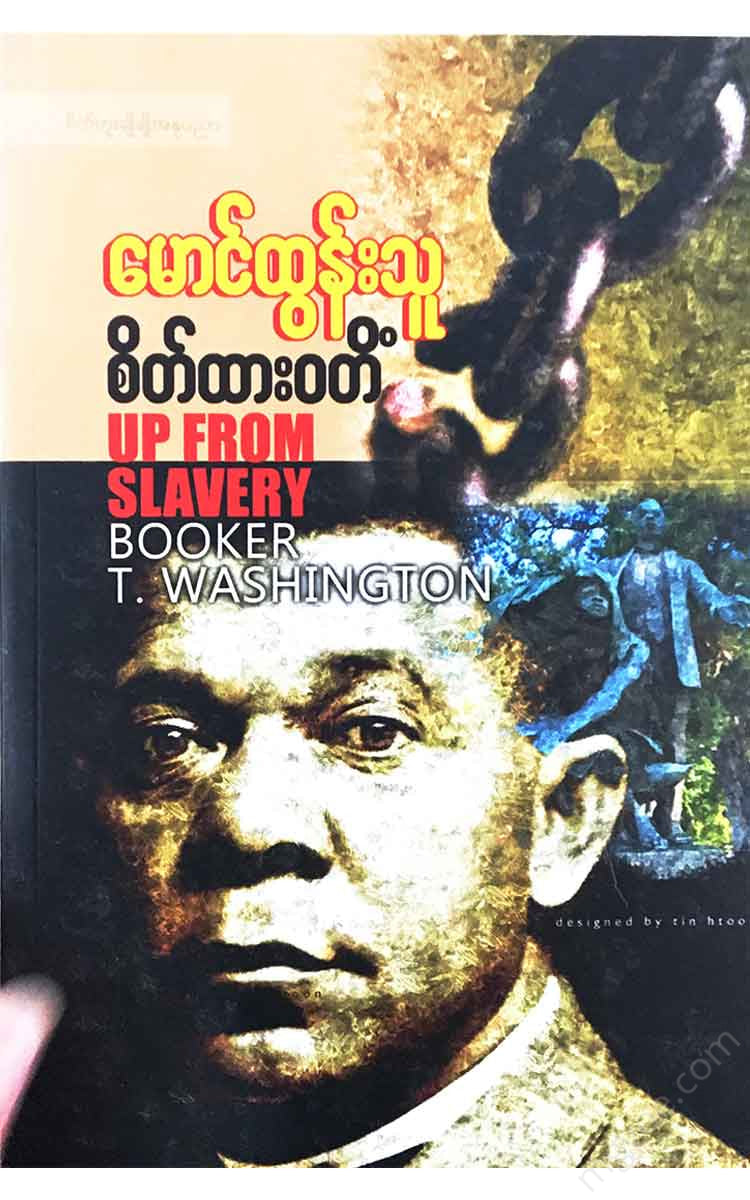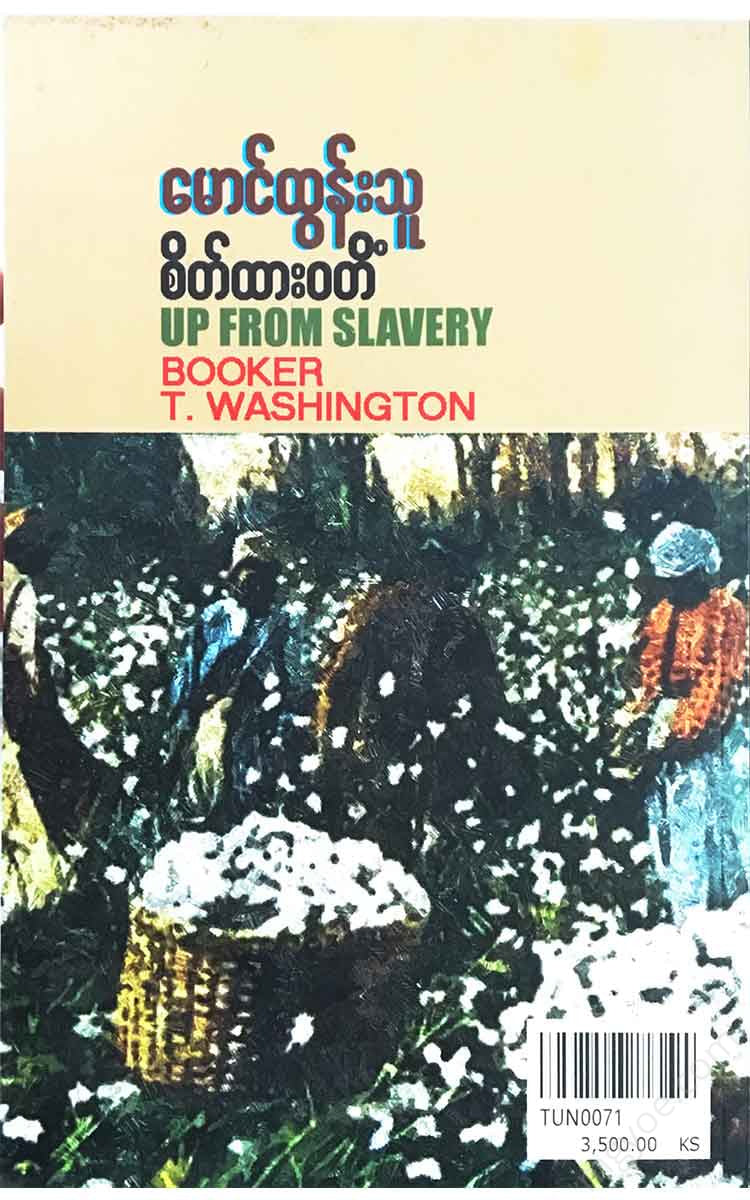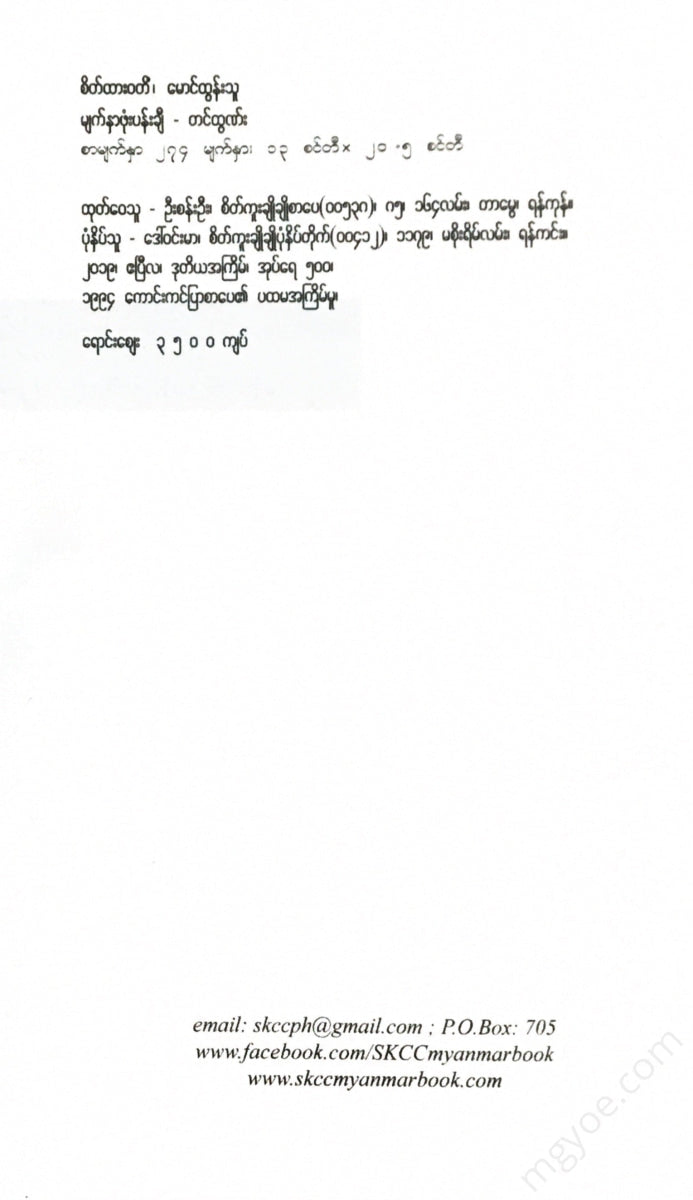စိတ်ကူးချိုချိုစာပေ
Maung Tun Thu - My Heart is Broken
Maung Tun Thu - My Heart is Broken
Couldn't load pickup availability
I was born a slave on a large plantation in Franklin County, Virginia.
I don't know the exact place and date of my birth.
I will just say that I am a person who was born somewhere at some point.
When I was old enough to ask questions, I learned that I was born in 1858 or 1859, near a post office called Aylfors, at a crossroads.
I don't know the month and day of birth.
What I remember now is a large farm and a row of slave houses within it.
The slave quarters are attached to the large plantation and have huts where the slaves live.
My life began in the midst of an extremely depressing environment, filled with the most heartbreaking suffering.
Saying such things is not cruel to the slave owners who own me.
Compared to other slave owners, my slave owners are not bad.
The hut where I was born was a single log cabin, measuring only fourteen by sixteen feet.
I lived in that tent with my mother, my brother, and my sister until the Civil War ended and all of us slaves were declared free from slavery.
I don't know anything about my parents' traditional lineage.
During my time living in the slave quarters, I heard whispers among the black people.
They are talking about how slaves were mistreated on ships brought from Africa to America.
Among the things they said were stories about my maternal grandparents being abused.
I've been researching my family's lineage, but I haven't found anything.
Apart from my mother, I knew absolutely nothing about my mother's ancestry.
As far as I remember, my mother had a cousin and a cousin.
That's all I knew. In fact, no one studied or documented the history of black families during the time of slavery.
No one was interested in doing that.
As far as I know, my mother was bought out because she and I were taken in by the slave owner who owned them.
I don't know anything about my father, I don't even know his name.
According to rumors, my father was a white man who lived on a farm near the large farm where we lived.
Whoever he is... from what I've heard, he's not interested in me. He hasn't helped me with a single penny of my support. But I don't blame him.
In fact, he was seen as an unfortunate victim of the system that was being adopted by the entire nation at that time.
The log cabin is not only used as a living space for our family, but also as a kitchen for the farm. | My mother is the cook for the farm.
Our tent has no glass windows. There are holes on either side, and those holes don't just let in light. They also let in cold air all winter long.
There was an entrance to the log cabin. The entrance door, although it was called a door, was not really a door. Not only was it hanging down from its hinges, but there was also a large hole in the door.
The log cabin was so narrow that it was an uncomfortable place to sit.
There is a square hole near the bottom right corner of the tent, which is called the "cat's entrance."
It is about fifty-six inches wide and is designed so that cats can enter and exit throughout the night.
At that time, every house in Virginia had a cat hole in it. I couldn't understand why ours had a cat hole in it, especially when it was full of holes.
Our tent has no wooden floor. We use the ground as a floor. | In the middle of the tent, there is a large, deep hole covered with planks on the ground.
That big hole is where sweet potatoes are stored during the winter.
I remember that big hole for a reason. While I was putting in and taking out the sweet potatoes, I would get one or two sweet potatoes. Whenever I got them, I would roast them and eat them. Every time I ate them, they were so delicious that I could never forget them.
We didn't have a separate stove for cooking on our farm. My mother, who had to cook for the white people and the slaves, had to cook in the middle of the hut using pots and pans.
Living in a makeshift tent is not comfortable.
In winter, our family suffers severely from the cold.
In the summer, people suffer severe heat from cooking on the stove.
My early life, spent in that small log cabin, was no different from the lives of thousands of other slaves. During the day, my mother was so busy with work and chores that she could barely pay attention to my brothers and sisters.
My mother often takes care of us during the early morning hours before she has to do her chores.
When his day's work is done and he arrives at night, he takes care of it to the best of his ability.
There is one thing that sticks in my mind. It is nothing else. One night, my mother cooked a chicken very late at night and fed it to us when we woke up.
I don't know where or how the mother got that chicken. However, I assume that it was a chicken brought from the owners' chicken farm.
Some people would call this act theft. If I had seen this act in such a time as this, I would have accused it of theft and condemned it.
Anyway... At that time, I knew very well why my mother did this, but I couldn't think of her as a thief. If they said that my mother was a thief and was guilty, I wouldn't accept it.
In reality, my mother was just a victim of slavery.
As far as I remember
"Emancipation from slavery decree"
Until it came out, our family didn't have a warm bed to sleep in.
My three children, my brother John, my sister Amanda, and I, had to sleep on a ragged straw mat spread on the ground.
To be more precise, we slept on straw mats, covered in very dirty rags.
When I became an adult, some people asked me what sports I played when I was younger.
To be honest... I had never played any sport until that question was asked. There was never a time in my life when I was passionate about playing.
When I was young, I spent my time doing something every day. Now that I'm an adult, I often think that if I had had more time to play when I was young, I could have been a more useful person to society.
When I was a slave, I wasn't old enough to do much work. However, I didn't spend all my time working.
Every day, I am overwhelmed with the work of carrying garbage in the yard, delivering drinking water to the workers in the yard, and going to the factory, so I have no free time. I go to the factory once a week to deliver wheat to be ground.
The factory was about three miles from our farm. I dreaded the work of going to the factory. On the day I went to the factory, I had to carry heavy sacks of wheat and put them on the back of a horse. When I was loading, I had to be very careful to keep the weight on both sides.
No matter how carefully you load them, when you set off on a journey, the bags of wheat on the horse's back tend to shift due to the horse's movements.
Then, the bags of wheat, whose weight was uneven on both sides, would slide off the horse's back. When the bags of wheat fell, I would fall too.
If the sacks of wheat fall, I get into trouble. It's not easy for a child like me to load the sacks of wheat back onto the horse. I have to wait for someone to come and go. Sometimes I have to wait for hours.
Fortunately, I was saved from this trouble when someone came. Usually, whenever I face this situation and have to wait for someone to come, I sit down and cry in despair.
In times like these, I arrive late at the factory.
Therefore, when I returned home after grinding wheat, I was late.
I only got back at night. There were hardly any people on the street.
The journey often took me through the forests, and I was constantly in a state of fear.
I was terrified because I had heard rumors that the forests were full of deserters from the army, and that if anyone met a deserter, their ears would be cut off.
Furthermore, whenever he returned late from the mill, he was not only subjected to hot and cold punishment but also to beatings with a cane.
As a slave, I was not educated. As far as I can remember, when the daughter of my slave owner went to school, I had to carry her books and accompany her, so I rarely reached the school gate.
Seeing so many boys and girls my age studying in the classroom, I felt a strong desire to study. The thought of how good it would be to be in school like them entered my mind.
It was one morning that I first realized that all of us black people were slaves and that we were discussing the issue of freeing slaves.
That morning, my mother woke me up. She knelt down with her children and prayed to God. | She prayed that Lincoln and his army would win and that God would help her and her children escape slavery.
At that time, black slaves throughout the South were almost entirely illiterate.
They don't read books or newspapers at all. But they not only understand the national issues that are stirring up the entire country, but they are constantly updated with news about these issues. How do they know? I don't understand at all.
Anyway... Negro slaves are aware of all the movements that have taken place since Garrison and Lovejoy began demanding the emancipation of slaves.
Throughout the period of the civil war, which was about to become a civil war, and the civil war itself, I was just a child.
However, almost every night, I could hear my mother and the other servants whispering and discussing. Judging by their words, it was clear that they all knew and understood the situation.
This was not because of anything else. It was because of the "telephone." ) | When Lincoln was running for president, we knew exactly what the slaves on our plantations were making about political promises. When the Civil War broke out between the North and the South, every slave on our plantation understood that the abolition of slavery was the main point of the Civil War.
It's not just us. The slaves on the big plantations in areas further away than us also know the truth.
They also understood the key point: if the North won, all slaves would be freed.
All the slaves kept an eye on the victories of the northern armies and the defeats of the southern armies. They were also very interested.
It is often seen that slaves receive news of victories and losses in wars before white people do.
Our plantation owner used to send a servant to the post office to pick up letters.
The post office is only about three miles from our farm.
At that time, letters only arrived once or twice a week.
The black man who had gone to the post office suddenly did not return immediately, but instead moved around among the white people who were talking near the post office.
Listen to what white people say without any pretense. | White people often read the hot letters in the mail and discuss the latest news.
Everything they said reached the ears of the black slave on our farm.
As soon as the black man who carried the letter returned to the farm, he first told our servants all the news he had heard.
In this way, slaves learned very important news before their masters did.
When I was a child and a teenager, I never saw our family sit together at the table, eating and drinking together. | I never saw them reflect on God's grace before eating.
I have never experienced a situation where I had to eat and drink politely.
Child slaves on large plantations in Virginia were fed the same food as animals.
There was bread in one place, meat in another. | The children would go and get food from wherever they could. Each meal was a glass of milk. Sometimes they would boil potatoes instead of milk. Sometimes there were no plates, so the three of us siblings would eat with frying pans or pots.
The plates were iron plates, which they had to eat on their knees. There were no spoons or forks to eat with, they had to eat with their own hands.
When I was quite young, I would go to the big house every time I ate. The slave owner's family would have to use a large, pulley-mounted fan to keep flies out of the house during meals.
White people usually talked about emancipation and the Civil War at the dinner table.





